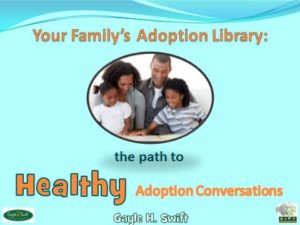 Adoption deeply influences a family. IT MATTERS! Families must talk about it. If we resist or avoid conversations about adoption, our children will falsely infer that their adoption is a shameful secret. This may lead them to have conflicted emotions, identity challenges, as well as a lack of resilience to bounce back when things get tough.
Adoption deeply influences a family. IT MATTERS! Families must talk about it. If we resist or avoid conversations about adoption, our children will falsely infer that their adoption is a shameful secret. This may lead them to have conflicted emotions, identity challenges, as well as a lack of resilience to bounce back when things get tough.
If parents–consciously or unconsciously–telegraph to their kids that talking about adoption distresses parents, kids will stuff their fears and worries and will then struggle to handle adoption complexity on their own and without the “guardrail” of parental support. Intentional parents know their children need parental support to figure out how to braid together a healthy, cohesive identity that respects all of their parts. Books serve as an immensely valuable tool for helping families address adoption complexity. A loving parent’s lap offers the perfect, safe place to share a book that helps them talk about this significant part of their family. They benefit both parent and child in powerful ways. Here are the top six ways:
1. Because you built your family through adoption, you have some additional adoption-connected parenting tasks. When you adopted, you obligated yourself to become the best parent possible. This means you must educate yourself on how adoption adds additional layers or responsibility and challenge to your parental role, to family dynamics, and to be envoys for your children. To fulfill those tasks, you need help identifying and performing them well. Books provide insight, strategies, and encouragement. They introduce new ideas that parents can consider and they can reveal issues that parents may not even realize exist or need to be handled.
2. Your children also have “inherited” adoption-related tasks which they must handle to ensure they grow into their best version of themselves. Books offer a safe chance to explore the topic. They create a chance to ask questions that reveal a child’s beliefs and fears about adoption. Parents can then address them and allay their children’s fears.
3. It is not easy to find the “right” time to talk about the challenges, questions, and conflicts that adoption creates. Books create non-threatening ways of asking questions, exploring solutions, and describing complex emotions. They offer models of possibilities and a chance to imagine how potential tactics might work. Families can discuss the strategies and decisions which the characters chose, how effectively they worked, and the likelihood that it might work for other families (including one’s own.)
4. An accessible, well-stocked adoption bookshelf sends a message: that adoption is a safe and welcome topic. It telegraphs to children that parents are comfortable discussing adoption, that they can handle the conversation, and that they believe it is something they want to discuss as a family.
5. Children can pick a book off the shelf when they feel the urge or need to talk about adoption. It’s easier for them to hand a book to a parent that to open a conversation with a “Mom, we need to talk…”
6. Books help parents and children feel less isolated, less different. They help families feel like part of a tribe of other families facing the same situations. This helps reduce the feeling of being different and encourages a sense of shared community.
For specific book suggestions, check out our list here. Next week we will explore: Five Reasons Your Family Adoption Library Can’t Handle Everything.
Contact us: 1-800-653-9445.
Listen to our podcasts: Adoption Matters: Real People. Real Life. Real Talk and Essentials of Adoption Attuned Parenting
Watch our YouTube channel
Read Books written by our coaches
Click to learn more about Adoption Attuned Certified coaching!



Years and years and years ago there was an active effort made to hide adoption. Year and years ago there was silence. And years ago there was some talk about it. I think now there is an effort to talk about first families and adoption. Some people even choose to include first families into their parenting. Though each circumstance may dictate different choice, acknowledging and talking about adoption as you suggest is healthy. #adoption #adoptivefamilies #AAQ